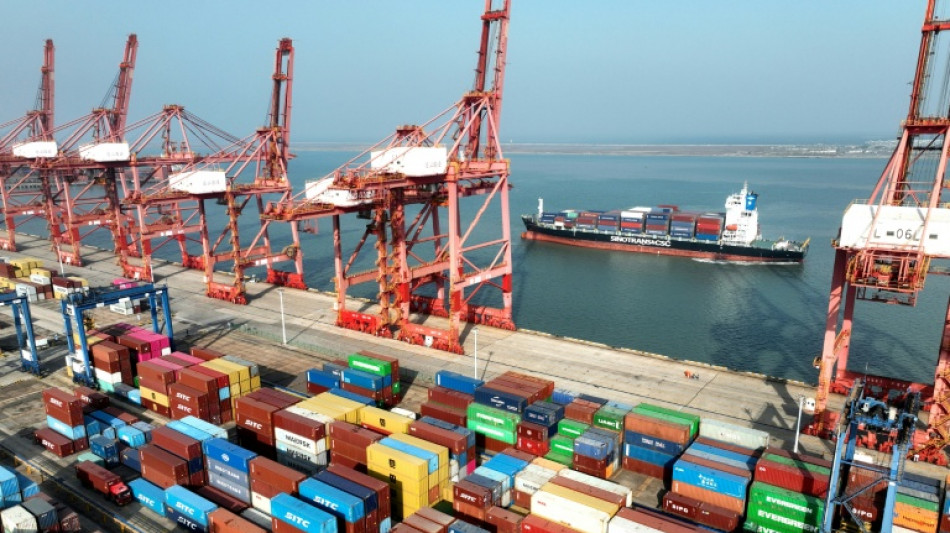
-
 Trump admin insists Iran strikes success, attacks media
Trump admin insists Iran strikes success, attacks media
-
Anna Wintour steps down as US Vogue editor after nearly 40 years

-
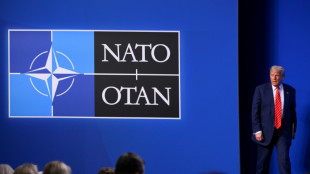 How Trump finally learned to love NATO -- for now
How Trump finally learned to love NATO -- for now
-
Faith Kipyegon misses out on bid for first female sub-4 minute mile

-
 Spain PM alleges 'genocide' in Gaza as rescuers say 65 killed
Spain PM alleges 'genocide' in Gaza as rescuers say 65 killed
-
Fritz wins twice in one day to step up Eastbourne title defence

-
 St. Bernards romp at unique Swiss theme park
St. Bernards romp at unique Swiss theme park
-
RFK Jr panel votes against ingredient targeted by anti-vaxxers

-
 Anna Wintour steps down as editor of US Vogue after nearly 40 years
Anna Wintour steps down as editor of US Vogue after nearly 40 years
-
Sean 'Diddy' Combs used 'power, violence and fear': prosecutor

-
 Irish legend O'Mahony to lead BaaBaas in South Africa
Irish legend O'Mahony to lead BaaBaas in South Africa
-
In-form Russell ready to get his elbows out against Verstappen

-
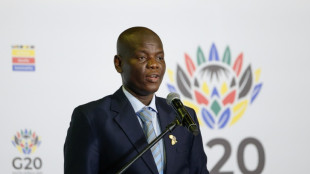 G20 president S.Africa warns global turmoil hurts poorer nations
G20 president S.Africa warns global turmoil hurts poorer nations
-
Chase and Hope steady as West Indies eye lead over Australia

-
 McLaren tell Piastri and Norris to carry on racing
McLaren tell Piastri and Norris to carry on racing
-
Champion jockey Oisin Murphy charged with drink driving

-
 Iran strikes damage hard to assess under Israeli military censorship
Iran strikes damage hard to assess under Israeli military censorship
-
Argentina to try 10 in absentia over 1994 bombing of Jewish center
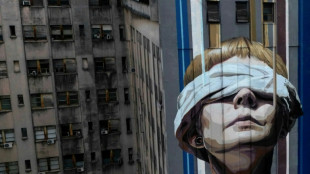
-
 Spain court suspends huge Ryanair 'abusive practices' fine
Spain court suspends huge Ryanair 'abusive practices' fine
-
Top US court allows states to defund largest abortion provider
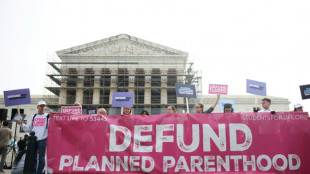
-
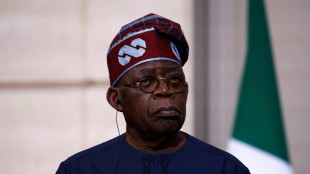 Nigeria's Tinubu signs major tax overhaul
Nigeria's Tinubu signs major tax overhaul
-
COP30 to be held in Amazonian city despite accommodation concerns: CEO

-
 Netanyahu seeks to postpone trial summons after Trump backing
Netanyahu seeks to postpone trial summons after Trump backing
-
South Africa's Sundowns make impact felt at Club World Cup

-
 Frenchman who robbed Kim Kardashian dies of cancer aged 69
Frenchman who robbed Kim Kardashian dies of cancer aged 69
-
Vehicle hits pedestrians near primary school in Beijing
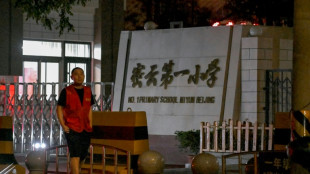
-
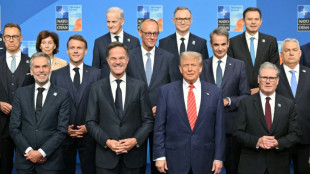 After NATO deal, how far will EU go for trade peace with Trump?
After NATO deal, how far will EU go for trade peace with Trump?
-
Pentagon chief backs Trump on success of Iran strikes

-
 Mbappe files harassment complaint against PSG
Mbappe files harassment complaint against PSG
-
New chief Coventry says IOC will launch gender working group
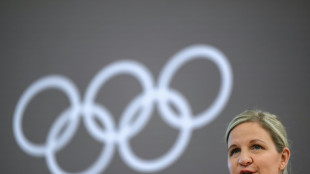
-
 US panel replaced under Trump backs new shot for kids
US panel replaced under Trump backs new shot for kids
-
Roblox's Grow a Garden explodes online video game numbers

-
 Bezos wedding festivities kick off in Venice
Bezos wedding festivities kick off in Venice
-
US stocks rise, dollar slides as Trump eyes new Fed boss
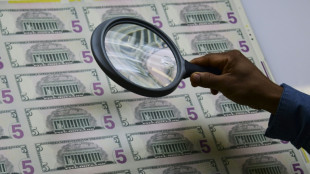
-
 Europe court condemns France over police racial profiling
Europe court condemns France over police racial profiling
-
Cristiano Ronaldo to stay at Al Nassr until 2027

-
 Nissanka ton puts Sri Lanka on top in second Bangladesh Test
Nissanka ton puts Sri Lanka on top in second Bangladesh Test
-
Spain PM alleges 'genocide' in Gaza as rescuers say 56 killed

-
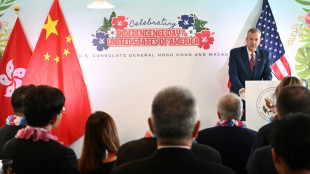 US Independence Day event no threat to Hong Kong security: consulate chief
US Independence Day event no threat to Hong Kong security: consulate chief
-
UN air service slashes fleet by nearly a quarter

-
 Napoleon collection sells at auction for $10 mn
Napoleon collection sells at auction for $10 mn
-
16 dead, thousands of businesses destroyed after Kenya protests

-
 In Finnish border town, worry mounts over Russian military build-up
In Finnish border town, worry mounts over Russian military build-up
-
Krejcikova suffers injury scare ahead of Wimbledon defence

-
 For Senegal women's basketball team, show goes on without US visas
For Senegal women's basketball team, show goes on without US visas
-
Spain PM alleges 'genocide' in Gaza as rescuers say 35 killed

-
 Liverpool sign Bournemouth defender Kerkez
Liverpool sign Bournemouth defender Kerkez
-
Archer back in England Test squad after four-year absence

-
 Khamenei says Trump 'exaggerated' impact of US strikes on nuclear sites
Khamenei says Trump 'exaggerated' impact of US strikes on nuclear sites
-
Spaceship carrying astronauts from India, Poland, Hungary, docks with ISS


How China could respond to Trump's new tariffs
From retaliatory tariffs on US goods like car parts and soy beans to controls on raw minerals essential for American manufacturing -- analysts say China has plenty of options if it wants to reply to fresh US levies.
US President Donald Trump over the weekend announced 10 percent tariffs on Chinese products, upping the stakes in a trade confrontation between the global superpowers that started eight years ago in his first term.
Beijing in response warned there were "no winners" in a trade war and vowed as yet unspecified countermeasures.
News that Canada and Mexico had agreed a deal with Trump to delay 25 percent tariffs on their goods was followed by his announcement that he would be holding talks with China "probably in the next 24 hours" to try for an agreement.
But, as the threat of new measures continues to hang over Beijing, eyes are on what officials there have lined up as a response.
With its economy still struggling with sluggish consumption and slow growth, observers expect China to keep its powder dry for now -- at least until another round of tariffs that could do greater damage.
"We expect China not to jump to immediate retaliation following the 10 percent tariff hike, but will keep the doors of negotiation and cooperation open," UBS bank analysts wrote in a note.
"We do not expect China to follow the same strategy as in the first round of tariff hikes in 2018-19."
Bilateral trade totalled more than $530 billion in 2024, according to US data, with exports of Chinese goods to the United States exceeding $400 billion. That was second only to Mexico.
But that yawning trade imbalance -- $270.4 billion in January-November last year -- has long raised hackles in Washington.
- Lesson learned? -
Key US demands in the first trade war were greater access to China's markets, broad reform of a business playing field that heavily favours Chinese firms, and a loosening of heavy state controls.
This time around Washington has also called for China to crack down on exports to Mexico of chemical components used to make the synthetic opioid fentanyl, responsible for tens of thousands of overdose deaths a year.
After long, fraught negotiations during Trump's first term the two agreed what became known as the "phase one" deal -- a ceasefire in the nearly two-year-old trade war.
Beijing was quick to retaliate throughout that standoff -- imposing tariffs of its own on everything from cars to soybeans, designed to inflict harm on Trump's voting base in rural America.
It also floated restrictions on exports of rare earth metals, of which China dominates global supplies and on which the United States remains heavily dependent.
And should a new trade war escalate, "measures could include tariffs, export controls on critical minerals essential for US manufacturing, restricted market access to US firms operating in China, or the depreciation of the yuan", Harry Murphy Cruise, head of China and Australia economics at Moody's Analytics, told AFP.
But he added Beijing may have learned its lesson from the first standoff.
"The tit-for-tat trade war in Trump's first term benefited no one; it made trade more costly and hindered growth in both countries," Murphy Cruise said.
- China's weaker position -
For now, analysts believe the latest measures won't bite too hard.
"The 10 percent tariff is not a big shock to China's economy," Zhang Zhiwei at Pinpoint Asset Management said in a note.
"It's unlikely to change the market expectation on China's macro outlook this year, which already factored in higher tariffs from the US," he added.
And that could allow China to keep its powder dry in the event Trump's first wave of tariffs are the prelude to a bigger showdown.
The US president has ordered an in-depth review of Chinese trade practices, the results of which are due by April 1.
That could serve as a "catalyst for more tariffs", said Murphy Cruise, pushing Beijing to shift tactics.
"This strategy of no retaliation may change if the US imposes additional significant tariffs later on," UBS economists said.
"In such a case, we think China may retaliate on a targeted basis and in a restrained manner, imposing tariffs on selected agricultural products, auto parts, energy," they said.
Experts added that China could also let the value of its currency devalue, increasing the competitiveness of its exports.
Trump's flagged talks with Beijing offer the two sides a chance to step back from the brink of a trade war that could hit hundreds of billions' worth of goods.
"China is looking to diffuse tensions," Murphy Cruise said.
"China's economy is in a much weaker position this time around; it will be substantially harder to withstand a barrage of tariffs."
O.Farraj--SF-PST
